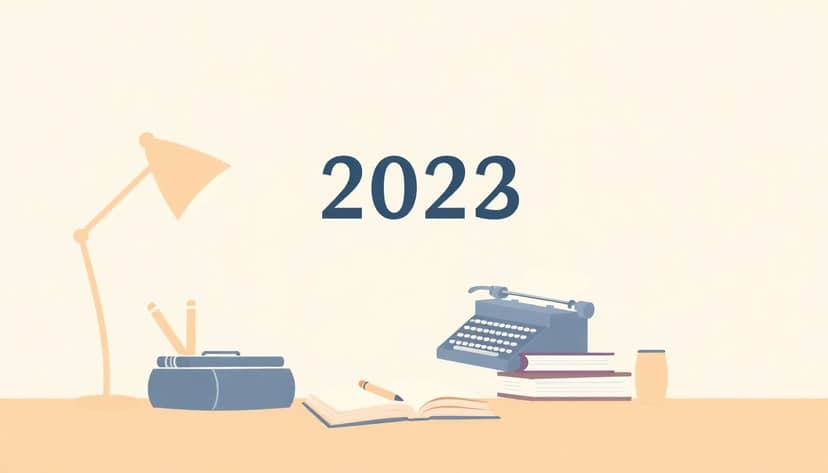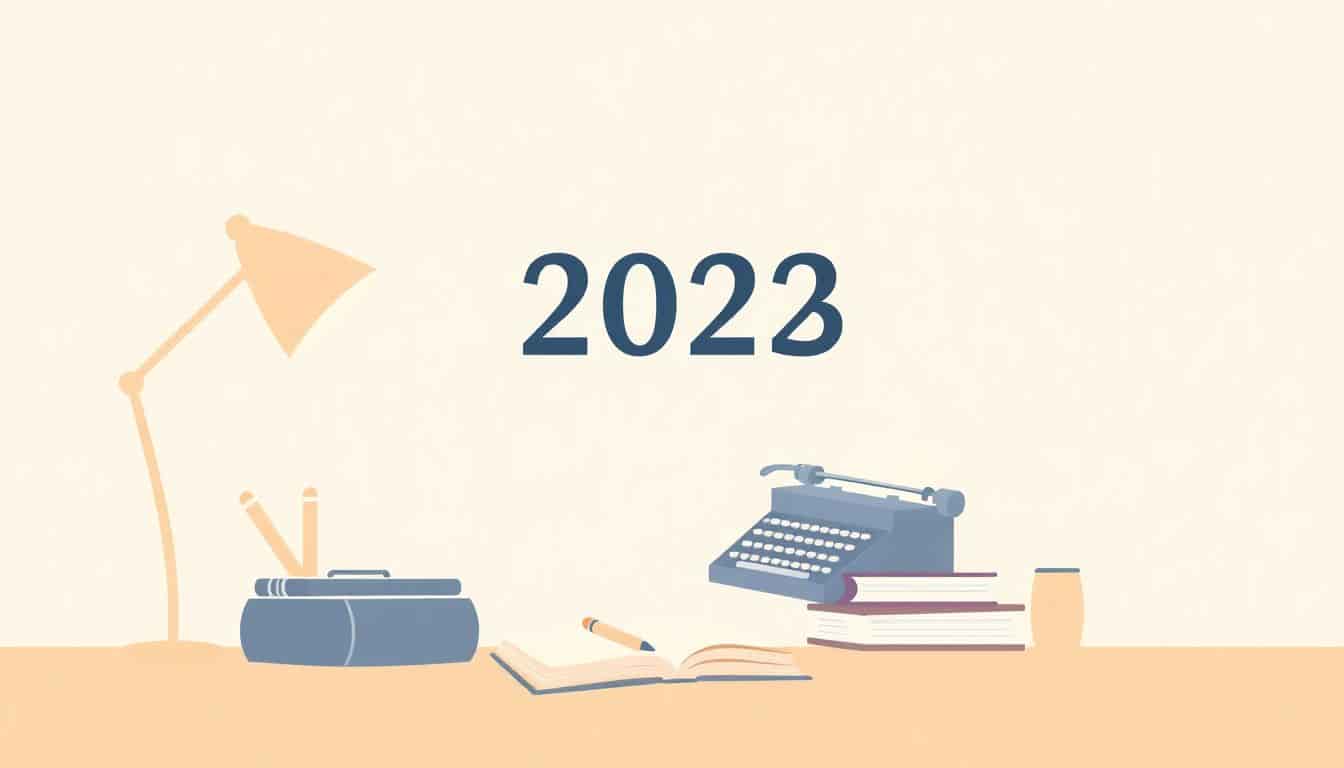Table of Contents
Looking for UK writing grants in 2025? I get it—accessing funding can feel like searching for a needle in a haystack. You're probably wondering which options are worth your time and how to get your application just right. Stick with me, and I’ll share some tips and info on the top grants and fellowships that could help bring your writing dreams closer to reality.
If you keep reading, you might find the perfect funding opportunity and learn how to apply confidently, boosting your chances of success. Whether you're a solo author or part of a literary group, there’s a grant out there waiting for you.
Here’s a quick look at what’s coming up—top grants, funding options for organizations and individuals, plus tips for choosing the right one and making a strong application.
Key Takeaways
Key Takeaways
- There are several UK writing grants in 2025, with funding opportunities for individuals and organizations. Success rates generally range from 18% to 22%, but expert applicants can improve their chances.
- Main grants include Arts Council Project Grants, Royal Literary Fund, Society of Authors bursaries, and academic research grants. There are also funding options for literary groups and community projects.
- To get funded, research each grant thoroughly, meet deadlines, and tailor your application. Clear project plans, polished samples, and supporting documents make a difference.
- Avoid common mistakes like generic applications, missing guidelines, and vague goals. Including proof of experience boosts credibility.
- Building a strong portfolio, submitting to smaller grants, and seeking feedback can improve future success. Staying organized helps track deadlines and progress.
- Use resources like writers’ organizations, workshops, and online forums to gain advice and support. This can help prevent mistakes and strengthen your applications.
- Persistence is key. Keep refining your approach, tell your story honestly, and don’t get discouraged by competition. Regular applications increase your chances over time.

What Are the Best UK Writing Grants for 2025?
Looking for funding opportunities to boost your writing career in the UK? In 2025, there are several notable grants and fellowships that can help you turn your ideas into published work or support your creative projects. With UK grantmakers awarding over £23 billion in 2023–24—representing a 7% rise from the previous year—there's plenty of financial backing available for writers.
Whether you're an individual author, part of a literary organization, or a community-focused writer, understanding your options can be the key to success. The general success rates for UK grants hover around 18–22%, but experienced applicants and professional grant writers often enjoy higher chances of securing funding—sometimes up to 60% with the right supporting documents.
Top UK Writing Grants and Fellowships Available in 2025
Let's start with some of the most prominent grants and fellowships that you should keep an eye on for 2025:
- Arts Council National Lottery Project Grants: Offering grants from £1,000 up to £100,000, this fund supports a wide range of creative projects, including literary initiatives, ensuring writers can access resources for both small and large-scale endeavors.
- British Academy/Leverhulme Small Research Grants: If your writing intersects with academic research or scholarly work, these grants provide up to £10,000 to help with research costs, especially for early-career scholars.
- Royal Literary Fund Grants: Designed specifically for UK writers facing financial hardship, these grants offer quick relief to those who need it most, supporting both emerging and established authors.
- Society of Authors Grants and Bursaries: Members of this professional body can access various funding options, including bursaries for research, travel, or project production, with application success rates often higher than the average.
In addition to those dedicated to individuals, there's support targeted at literary organizations:
- Amazon Literary Partnership 2025: This program funds diverse literary initiatives, from community projects to publishing startups. It’s an excellent opportunity for organizations championing underrepresented voices.
- Funding options for literary organizations in the UK: Other streams include Arts Council grants for organizations, which can range from small local projects to major national programs, with some strategic grants offering up to £150,000.
Grants for Individual UK Authors in 2025
For writers looking to fund their personal projects, several options are on the table:
- Royal Literary Fund Grants: These are some of the most accessible grants for individual authors, providing quick financial support to help with writing costs or to bridge gaps between projects.
- Society of Authors Grants and Bursaries: Whether you're working on your first novel or a scholarly manuscript, these bursaries help cover research expenses, travel costs, or manuscript development.
- Free Manuscript Assessments and Mentoring from The Literary Consultancy: While not a direct monetary grant, this support helps authors improve their submissions, increasing chances of success in other competitive funding options.
These grants tend to have strict eligibility criteria, so make sure to plan your application ahead of deadlines and tailor your submissions accordingly.
Additional Funding Opportunities for UK Writers
Beyond the main grants, several smaller or specialized funding options can give your writing a boost:
- Arvon Foundation Low Income Writing Grants: Aimed at writers from low-income backgrounds, these grants provide workshop bursaries and residencies.
- FundsforWriters Grants for UK Writers: A helpful resource compiling various smaller grants, competitions, and fellowships throughout the year.
- Literary Prizes and Awards That Offer Financial Support: Many literary awards include cash prizes, which can serve as a valuable funding source to support future projects.
Overall, competing for these smaller grants can be a good way to get started and build your experience with the application process.
How to Find the Right Grant and Apply Successfully
Matching your needs with the appropriate funding is essential. Start by researching each grant’s focus and eligibility requirements carefully.
Check deadlines well in advance—missed deadlines mean waiting another year—and prepare your application materials early. Make sure your project description is clear, your writing samples are polished, and you’ve included all necessary supporting documents.
When submitting, follow the guidelines precisely. Tailoring each application to match the grant’s mission and criteria can significantly boost your chances. And don’t forget: professional help from grant writers or experienced authors can increase success rates, which currently stand at 45–60% for those who seek assistance.

How to Maximize Your Chances of Securing a Grant
Getting funded isn’t just about having a good idea; it's about strategic planning and presentation. First, research each grant thoroughly to understand its focus, priorities, and what kinds of projects they typically support.
Next, tailor your application to match the funder’s expectations—use their language and highlight how your project aligns with their mission.
Keep your project budget realistic and detailed; funders want to see exactly how their money will be used and that you’re asking for a reasonable amount.
Don’t forget, a clear and compelling project description can make your application stand out. Include your goals, target audience, and expected impact.
Gather strong supporting materials, like writing samples, letters of support, or a detailed timeline, to boost credibility.
Submitting early gives you a buffer to catch errors and make adjustments before the deadline—plus, some grants are awarded on a first-come, first-served basis.
Lastly, consider enlisting the help of a professional grant writer or feedback from experienced writers, which can significantly increase your success chances, given that experienced applicants tend to have a success rate of up to 35%.
Understanding the Application Process and Deadlines
Most grants have strict deadlines, so create a calendar to track all important dates—missing one means waiting another year.
Start your prep early by collecting all necessary documents, like CVs, project outlines, and samples.
Read the application guidelines carefully—each fund might have different requirements, formats, or word limits.
Break down your application into manageable sections to avoid last-minute stress and ensure quality in each part.
Submit your application via the designated platform—many grants now use online portals that can sometimes be tricky, so allocate extra time for technical issues.
Follow up if applicable; some funders appreciate a polite check-in or clarification request to demonstrate your commitment.
Remember, success rates are generally between 18-22%, but being well-prepared can tip the scales in your favor.
Common Pitfalls to Avoid in Grant Applications
One of the biggest mistakes is submitting a generic application that doesn't address the specific goals of the grant.
Another is neglecting to proofread; typos and sloppy formatting can give the impression of unprofessionalism.
Failing to provide a detailed budget or vague project goals can lead to rejection—funders want to see clarity and precision.
Overestimating your project's potential or promises that seem too good to be true can raise red flags.
Don't ignore the guidelines; failing to follow instructions often results in automatic disqualification.
Lastly, don't forget to include strong evidence of your experience and past successes, which can boost your credibility.
Tips for Building Your Portfolio and Strengthening Future Applications
Keep a record of all your writing projects, achievements, and positive feedback—it can be useful when applying and when seeking references or support letters.
Regularly submit to smaller grants, competitions, or residencies to gain experience and get used to the application process.
Attend writing workshops, conferences, or join literary groups—these can provide networking opportunities and improve your craft.
Seek feedback on your work from peers or mentors, which helps refine your submissions and develop a strong portfolio.
Stay updated about new funding opportunities through industry newsletters or organizations like the Society of Authors.
Building a solid track record and demonstrating continuous progress can lead to higher success rates for larger grants in the future.
Additional Resources and Support for UK Writers
Many organizations offer free or low-cost advice on grant writing, including local writers' centers or literary charities.
The (https://www.societyofauthors.org/) provides guidance, mentorship, and updates on funding opportunities.
You might also consider joining online forums or social media groups where writers share tips and experiences with grants and funding.
Some universities and public libraries host workshops or have experts who can review your applications for free or a small fee.
Utilizing these resources can give you an edge and prevent common pitfalls that trip up first-time applicants.
Final Tips for Success in UK Literary Funding
Persistence pays off. Not every application will be successful, but keep refining your approach and learning from each attempt.
Remember, granting agencies favor clear, honest, and passionate proposals—so tell your story authentically.
Stay organized with a filing system to track ongoing applications, feedback received, and deadlines.
And finally, don’t be discouraged by tough competition—many grants support multiple projects each year, so keep trying and keep writing.
FAQs
Top UK writing grants for 2025 include the Amazon Literary Partnership, British Academy/Leverhulme Small Research Grants, and Royal Literary Fund Grants. These offer funding for writers, projects, and literary organizations to support creative work and research.
Review eligibility criteria, deadlines, and funding purpose to match your project with suitable grants. Consider the grant's focus, application requirements, and how it aligns with your writing goals before applying.
Prepare a clear project description, CV, writing samples, and a realistic budget. Follow application instructions carefully, demonstrate your project's value, and highlight your experience and plans clearly.
Yes, options like the Society of Authors Grants, Royal Literary Fund Grants, and programs from The Literary Consultancy are designed to support individual UK writers with funding and mentorship opportunities in 2025.



